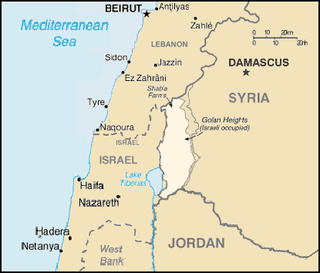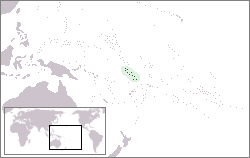
The United Nations General Assembly is one of the six principal organs of the United Nations (UN), serving as its main deliberative, policymaking, and representative organ. Currently in its 79th session, its powers, composition, functions, and procedures are set out in Chapter IV of the United Nations Charter.
A United Nations General Assembly resolution is a decision or declaration voted on by all member states of the United Nations in the General Assembly.

United Nations Security Council resolution 497, adopted unanimously on 17 December 1981, declared that the Israeli Golan Heights Law, which effectively annexed the Golan Heights, is "null and void and without international legal effect" and further calls on Israel to rescind its action.

United Nations Security Council Resolution 435, adopted on September 29, 1978, put forward proposals for a cease-fire and UN-supervised elections in South African-controlled South West Africa which ultimately led to the independence of Namibia. Importantly, it established the United Nations Transition Assistance Group (UNTAG) which oversaw the election and the South African withdrawal.

United Nations Security Council Resolution 1691, regarding the accession of Montenegro to the United Nations, was adopted without a vote on 22 June 2006. In the resolution, after examining the country's application for membership, the Council recommended to the General Assembly that it be admitted.

United Nations Security Council resolution 1290 was adopted on 17 February 2000. Resolution 1290 examined Tuvalu's application to become the 189th member of the United Nations (UN). Tuvalu achieved independence in 1978 after over eighty years of British colonial rule. The country had struggled economically, and it took the 2000 sale of Tuvalu's Internet country code top-level domain .tv for the nation to be able to afford UN membership. Resolution 1290 was adopted unopposed, although China abstained due to concerns over Tuvalu's relationship with Taiwan.

The Republic of Korea and the Democratic People's Republic of Korea were simultaneously admitted to the United Nations (UN) in 1991. On 8 August 1991, the UN Security Council passed Resolution 702, recommending both states to the General Assembly for membership. On 17 September 1991, the General Assembly admitted both countries under Resolution 46/1.
The People's Socialist Republic of Albania joined the United Nations on 14 December 1955, and has participated in several UN peacekeeping operations. The current Representative of Albania in the UN is Mr. Ferit Hoxha. Albania is a non-permanent member of the 15-country UN Security Council for the two-year term (2022–2023).

The United Nations Mission for Justice Support in Haiti (MINUJUSTH) was a peacekeeping mission in Haiti mandated by the United Nations Security Council through Resolutions 2350 (2017) and 2410 (2018). It was the successor to MINUSTAH.

United Nations Security Council resolution 2497 was adopted in 2019.

United Nations Security Council Resolution 2623 called for the eleventh emergency special session of the United Nations General Assembly on the subject of the 2022 Russian invasion of Ukraine. Albania and the United States introduced the resolution before the United Nations Security Council, which adopted it on 27 February 2022. Russia voted against while China, India and the United Arab Emirates abstained. As this was a procedural resolution, no permanent member could exercise their veto power.

United Nations Security Council resolutions are United Nations resolutions adopted by the fifteen members of the Security Council (UNSC); the United Nations (UN) body charged with "primary responsibility for the maintenance of international peace and security".

United Nations Security Council Resolution 2428 was adopted on 13 July 2018. According to the resolution, the Security Council voted to impose an arms embargo in South Sudan in addition to current sanctions until 31 May 2019.

United Nations Security Council Resolution 2410 was adopted on 10 April 2018. According to the resolution, the Security Council voted to extend the mandate of UN Mission for Justice Support in Haiti (MINUJUSTH) until 15 April 2019.

United Nations Security Council Resolution 2466 was adopted on 12 April 2019. According to the resolution, the Security Council voted to extend the mandate of UN Mission for Justice Support in Haiti (MINUJUSTH) until 15 October 2019.








